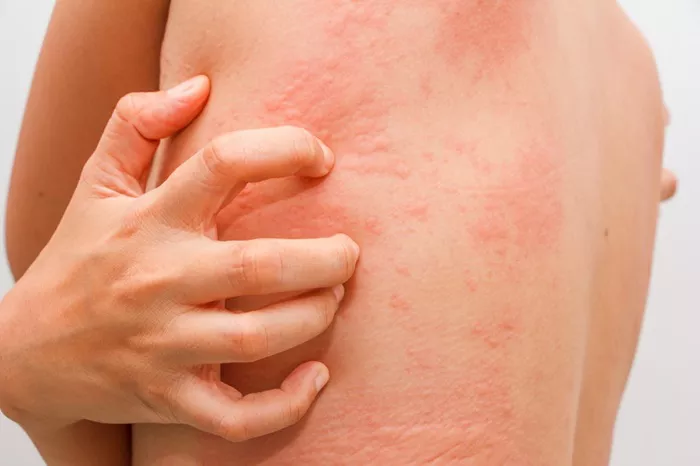Itchy skin, also known as pruritus, is a common and uncomfortable symptom often associated with allergic reactions. These reactions can be triggered by a variety of allergens, including foods, medications, insect stings, plants, and even certain materials. Addressing itchy skin effectively requires understanding the underlying cause, applying appropriate treatments, and following preventive measures to avoid future occurrences. This article will delve into comprehensive strategies to alleviate itchy skin caused by allergic reactions.
Understanding Itchy Skin and Allergic Reactions
What Causes Itchy Skin During Allergic Reactions?
When the body encounters an allergen, the immune system reacts by releasing histamines and other chemicals into the bloodstream. These substances cause inflammation and irritation, leading to symptoms such as redness, swelling, and itching. Common allergens include:
Foods: Nuts, shellfish, dairy products, and eggs.
Medications: Antibiotics, aspirin, and other non-steroidal anti-inflammatory drugs (NSAIDs).
Insect Stings/Bites: Bee stings, mosquito bites, and spider bites.
Plants: Poison ivy, poison oak, and ragweed.
Materials: Wool, latex, and certain metals in jewelry.
Symptoms of an Allergic Reaction
Itchy skin is often accompanied by other symptoms depending on the severity and type of allergic reaction. These may include:
1. Rash or hives (urticaria)
2. Redness and swelling
3. Blisters or bumps
4. Dry, cracked skin
5. Burning or stinging sensation
Severe allergic reactions, known as anaphylaxis, require immediate medical attention and can include symptoms such as difficulty breathing, swelling of the throat and tongue, rapid pulse, and a drop in blood pressure.
Immediate Relief for Itchy Skin
Cool Compresses and Baths
Applying a cool, damp cloth to the affected area can help soothe irritation and reduce itching. Cool baths, especially with added colloidal oatmeal or baking soda, can also provide relief. These substances have anti-inflammatory properties that can calm the skin.
Topical Treatments
Over-the-counter creams and ointments can be very effective in managing itchy skin:
Hydrocortisone Cream: This corticosteroid reduces inflammation and itching. It is available in various strengths, with lower concentrations available without a prescription.
Calamine Lotion: Often used for poison ivy and chickenpox, calamine lotion can soothe and dry out oozing skin lesions.
Antihistamine Creams: These creams block histamine release, providing relief from itching.
Oral Antihistamines
Oral antihistamines, such as diphenhydramine (Benadryl), cetirizine (Zyrtec), and loratadine (Claritin), can reduce itching by blocking histamine in the body. Non-drowsy options like cetirizine and loratadine are preferable for daytime use.
Avoiding Scratching
Scratching itchy skin can worsen the irritation and potentially lead to infection. Keeping nails trimmed and wearing gloves at night can help prevent unconscious scratching. Applying a bandage or dressing to the affected area can also protect the skin.
Long-Term Management and Prevention
Identify and Avoid Triggers
Keeping a diary of foods, medications, and activities can help identify potential allergens. Once identified, avoiding these triggers is crucial. For example, people allergic to nickel should avoid jewelry containing nickel, and those with latex allergies should use latex-free products.
Skin Care Routine
Maintaining a proper skincare routine can help prevent and manage itchy skin:
Moisturize Regularly: Use hypoallergenic, fragrance-free moisturizers to keep skin hydrated. Moisturizing immediately after bathing helps lock in moisture.
Gentle Cleansers: Use mild, fragrance-free soaps and cleansers to avoid irritating the skin.
Bathing Practices: Take shorter baths and showers in lukewarm water to prevent skin from drying out. Avoid using hot water, which can strip the skin of its natural oils.
Clothing and Environment
Choosing the right clothing and maintaining a conducive environment are essential for skin health:
Wear Loose, Soft Fabrics: Cotton and silk are gentle on the skin, while wool and synthetic fabrics may cause irritation.
Control Indoor Climate: Use humidifiers in dry climates to keep indoor air moist. Avoid extreme temperatures and maintain a comfortable humidity level.
Medical Treatments and Interventions
Prescription Medications
For severe or persistent itching, a healthcare provider may prescribe stronger medications:
Corticosteroids: Prescription-strength topical or oral corticosteroids can reduce severe inflammation.
Calcineurin Inhibitors: Tacrolimus (Protopic) and pimecrolimus (Elidel) are non-steroidal medications that reduce immune system activity and inflammation.
Immunosuppressants: For chronic conditions like eczema, drugs like cyclosporine may be prescribed.
Phototherapy
Phototherapy, or light therapy, involves exposing the skin to controlled amounts of natural or artificial ultraviolet light. This treatment can be effective for chronic itching and certain skin conditions, including eczema and psoriasis.
Allergy Testing and Immunotherapy
If the allergen is unclear, allergy testing can identify specific triggers. Skin prick tests, blood tests, and patch tests are common methods. Once identified, immunotherapy (allergy shots) can help desensitize the immune system to specific allergens over time.
Natural and Home Remedies
Aloe Vera
Aloe vera has anti-inflammatory and soothing properties. Applying pure aloe vera gel to the affected area can provide relief from itching and irritation.
Coconut Oil
Coconut oil is a natural moisturizer with anti-inflammatory properties. It can be particularly useful for dry, itchy skin. Apply virgin coconut oil directly to the skin to lock in moisture.
Apple Cider Vinegar
Diluted apple cider vinegar can help balance the skin’s pH and has antibacterial properties. Mix one part vinegar with three parts water and apply with a cotton ball to the affected area.
Honey
Honey has natural antibacterial and anti-inflammatory properties. Applying a thin layer of honey to itchy skin can soothe and promote healing.
Herbal Remedies
Chamomile: Chamomile tea or oil can be used as a compress to calm irritated skin.
Peppermint: Peppermint oil, diluted with a carrier oil, can cool and soothe itchy skin.
Neem: Neem oil and neem-based creams are effective for treating itchy skin and rashes.
When to Seek Medical Attention
While most cases of itchy skin from allergic reactions can be managed at home, it’s important to seek medical attention if:
The itching is severe and unrelenting.
There is no improvement with over-the-counter treatments.
The skin shows signs of infection, such as increased redness, warmth, swelling, or pus.
The itching is accompanied by other severe symptoms, such as difficulty breathing, swelling of the face or throat, or a rapid heartbeat.
These symptoms could indicate a more serious condition or a severe allergic reaction that requires immediate medical intervention.
Conclusion
Itchy skin from allergic reactions can be distressing, but with proper care and management, relief is achievable. Immediate treatments like cool compresses, topical creams, and antihistamines can provide quick relief. Long-term strategies, including identifying and avoiding triggers, maintaining a good skincare routine, and possibly undergoing medical treatments, can help manage and prevent future occurrences. Natural remedies offer additional options for soothing itchy skin. However, it’s crucial to seek medical advice when necessary to ensure appropriate treatment and to rule out serious conditions. By taking a comprehensive approach, individuals can effectively manage itchy skin and improve their overall quality of life.
[inline_related_posts title=”You Might Be Interested In” title_align=”left” style=”list” number=”6″ align=”none” ids=”9148,9145,9081″ by=”categories” orderby=”rand” order=”DESC” hide_thumb=”no” thumb_right=”no” views=”no” date=”yes” grid_columns=”2″ post_type=”” tax=””]
































